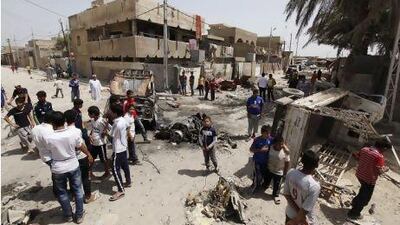BAGHDAD // Insurgents in Iraq deployed a series of car bombs as part of coordinated attacks across the country yesterday, killing at least 55 on the deadliest day in nearly a month.
There was no immediate claim of responsibility, but coordinated attacks are a favourite tactic of Al Qaeda's Iraq branch.
The intensifying violence, some of it related to the provincial elections scheduled for Saturday, is worrying for Iraqi officials and Baghdad-based diplomats alike. At least 14 election candidates have been killed in recent weeks, including one killed in an apparent ambush on Sunday.
"Of course we are concerned about the violence in the country that has been increasing in the last weeks," the United Nations envoy, Martin Kobler, said yesterday. He condemned the bloodshed and urged Iraqi officials to push ahead with the elections. "They should be free and fair, and every voter should go to the polls free of intimidation and fear," he said.
Maj Gen Hassan Al Baydhani, the No 2 official at Baghdad's military command, said authorities managed to defuse three car bombs in Baghdad before they could go off.
He described the violence as an attempt to derail the elections and to intimidate voters. "The terrorists want to grab headlines as we approach election day," he said.
Yesterday's attacks - most of them car bombings - were unusually broad in scope. Among the places targeted were the Sunni-dominated western Anbar province, and Saddam Hussein's hometown of Tikrit, the ethnically contested oil-rich city of Kirkuk and towns in the predominantly Shiite south.
The worst attacks hit Baghdad, where multiple car bombs and other explosions killed 25 people.
In one attack, a parked car bomb exploded at a bus station in the eastern suburbs of Kamaliya, killing four and wounding 13.
Two more car bombs exploded in an attack in a car park near the heavily guarded entrances to Baghdad international airport. Three people were killed, including a bodyguard of a Shiite parliamentarian whose convoy was passing by. The MP escaped unharmed.
"This attack and other attacks that took place today were part of the continuous efforts by Al Qaeda terrorists to shake the security and political situation ahead of the upcoming elections," said Diaa Al Asadi, a political ally of the MP who was travelling in the convoy.
At sunset, a parked car bomb exploded near car dealerships in the eastern Habibiya neighbourhood, killing 10. Other blasts struck the capital's Kamila, Karrada, Shurta, Baladiyat and Umm Al Maalif neighbourhoods.
In and around the ethnically mixed northern city of Kirkuk, three car bombs went off simultaneously - one in an Arab district, one in a Kurdish one, and one in a Turkomen district - killing four. Three other car bombs exploded outside the city, killing another five.
Kirkuk, about 290 kilometres from Baghdad, is home to a mix of ethnic groups with competing claims to the oil-rich region.
The day's mayhem began at about 6.30am in the former insurgent stronghold of Fallujah, when a suicide bomber drove a care packed with explosives car into a police checkpoint, killing two policemen and wounding six others.
Later in the day, two bodyguards assigned to a spokesman for anti-government protests that have raged for months were killed when a bomb attached to their car exploded on the road between Ramadi and Fallujah. A similar bomb stuck to another car in the area killed two others.
Another 15 people were killed and dozens were wounded in attacks in Baqouba, Buhriz, Khalis, Mosul, Mussayab, Nasiriyah, Rutba, Tarmiyah and Tikrit, said police.

